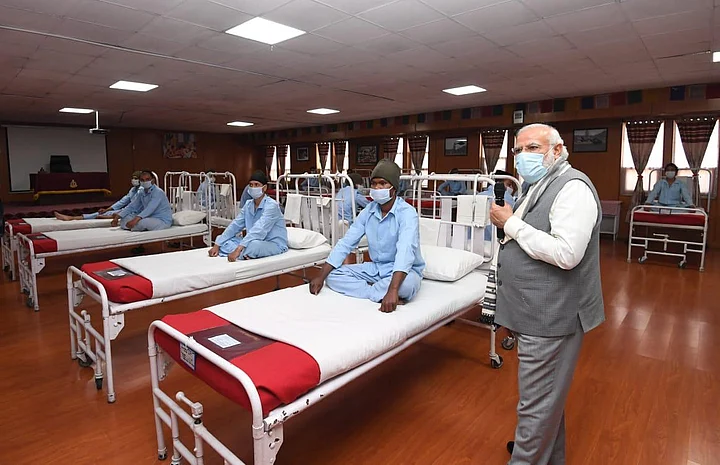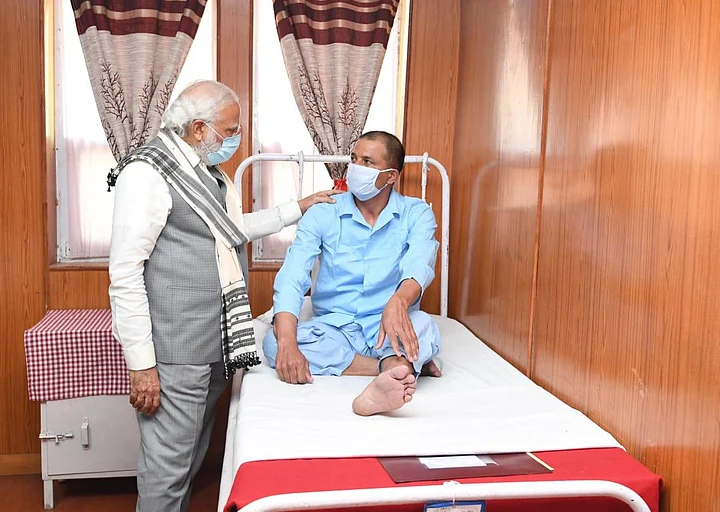Video Editor: Deepthi Ramadas
Video Producer: Shohini Bose
After addressing soldiers during his visit to Ladakh on Friday, 3 July, Prime Minister Narendra Modi also met the soldiers who were injured in the Galwan Valley and paid tribute to those who were martyred in the deadly brawl.
“The braves who left us, they didn’t depart without reason, all of you gave a befitting reply. Your bravery, the blood you shed will inspire our youth and countrymen for generations,” said PM Modi on the clashes on 15 June.
PM Modi continued, “our country has never bowed down and will never bow down to any world power, and I am able to say this because of braves like you.”
‘Age of Expansionism Is Over’
Earlier, as well, in a veiled message to China, he asserted, “The age of expansionism is over, this is the age of development. History has witnessed that expansionist forces have either lost or were forced to turn back,” adding that it's not the weak but the brave who can initiate peace.
Here are six key statements from his address to the soldiers in Ladakh:
- The bravery that you and your compatriots showed, a message has gone to the world about India’s strength... Your courage is higher than the heights of where you are posted today.
- I want to salute you all and all the soldiers who laid down their lives for the motherland. Every corner, every stone, every river and every pebble here in Ladakh knows it is an integral part of India.
- India’s resolve for ‘atmanirbhar Bharat’ (self-reliant India) has become stronger because of you and your strong resolve.
- Bharat Mata's enemies have seen your fire and fury.
- You have shown exemplary dedication in Galwan Valley; country is proud of all of you.
- The conditions in which you all deliver your best are among the toughest in the world, and you have proven time and again that the Indian armed force is mightier and better than everyone else in the world. What you have done here, the message you have sent, is a message that has reached the world. And it has been a bold statement.
Modi’s visit, along with Chief of Defence Staff (CDS) Bipin Rawat and Army Chief MM Naravane, came amid tensions with China in the aftermath of the Galwan Valley clash in which 20 Indian Army personnel were killed.
Earlier, Defence Minister Rajnath Singh said the PM's visit to Ladakh and his meeting with soldiers has boosted the morale of the army. “I appreciate this step by the PM and thank him for it,” he said in a tweet in Hindi.
Meanwhile, after the PM's visit, China's Foreign Ministry spokesperson Zhao Lijian said that India and China are engaged in communication and negotiations on lowering temperatures through military and diplomatic channels.
"No party should engage in any action that may escalate the situation at this point," he added.
Briefed by Lt Gen Harinder Singh
During his surprise visit, Modi visited Nimmu, an army base along the Srinagar-Leh highway, and interacted with personnel from the army, air force, and Indo-Tibetan Border Police (ITBP).
Among the officials who briefed him was Lieutenant General Harinder Singh, who has represented India at the Corps Commander-level talks with China to de-escalate along the LAC.
Northern Army Commander Lieutenant General YK Joshi was also present during the briefing.
During his 'Mann ki Baat' address on 28 June, PM Modi had said that "a befitting reply has been given to those who cast an evil eye on Indian territory in Ladakh".
“Our brave soldiers have shown that they will never allow the honour of mother India to be hurt,” he had said.
After an all-party meeting, on 19 June, to discuss the India-China border situation, Modi had indicated that China did not cross the border or take over any Indian post.
Slammed by the Congress, the PM's Office later denounced "attempts to give mischievous interpretation" to his remarks, clarifying that his "observations that there was no Chinese presence on our side of the LAC pertained to the situation as a consequence of the bravery of our armed forces."
(With inputs from ANI and PTI.)
(At The Quint, we question everything. Play an active role in shaping our journalism by becoming a member today.)

